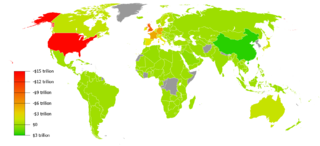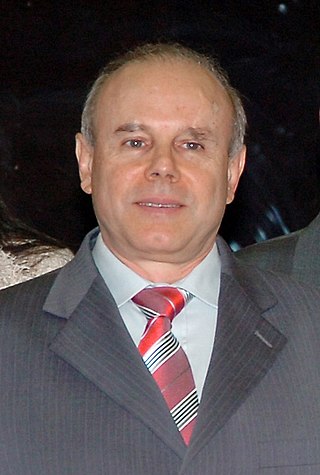This article needs additional citations for verification .(April 2009) |
Acmetal, alternatively Akmetal or "AC metal", meaning "peak capital" or "best capital", is a universal currency that was proposed by Kazakhstan's President Nursultan Nazarbayev.
This article needs additional citations for verification .(April 2009) |
Acmetal, alternatively Akmetal or "AC metal", meaning "peak capital" or "best capital", is a universal currency that was proposed by Kazakhstan's President Nursultan Nazarbayev.
Akmetal is a portmanteau of the Greek word “acme” – the highest point or zenith – and “capital.”
A one-global currency prompts the creation of a one-global central bank to manage the currency, thereby superseding the authority of national central banks like the Federal Reserve in the United States and the European Central Bank.
The A.P. said: Nazarbayev's proposal has raised eyebrows in some quarters, but the idea was embraced by Robert Mundell, who won the Nobel prize for economics in 1999 for helping lay the theoretical groundwork for Europe's single currency. [1] “It would be a very good idea if the G-20 took that idea up in London,” Mundell said.
The International Monetary Fund said that the currency idea was "interesting, but poorly explored". [2]

A central bank, reserve bank, or monetary authority is an institution that manages the currency and monetary policy of a country or monetary union. In contrast to a commercial bank, a central bank possesses a monopoly on increasing the monetary base. Many central banks also have supervisory or regulatory powers to ensure the stability of commercial banks in their jurisdiction, to prevent bank runs, and in some cases also to enforce policies on financial consumer protection and against bank fraud, money laundering, or terrorism financing.

The euro is the official currency of 20 of the 27 member states of the European Union. This group of states is officially known as the euro area or, commonly, the eurozone, and includes about 344 million citizens as of 2023. The euro is divided into 100 euro cents.

Robert Alexander Mundell was a Canadian economist. He was a professor of economics at Columbia University and the Chinese University of Hong Kong.

A reserve currency is a foreign currency that is held in significant quantities by central banks or other monetary authorities as part of their foreign exchange reserves. The reserve currency can be used in international transactions, international investments and all aspects of the global economy. It is often considered a hard currency or safe-haven currency.

The global financial system is the worldwide framework of legal agreements, institutions, and both formal and informal economic action that together facilitate international flows of financial capital for purposes of investment and trade financing. Since emerging in the late 19th century during the first modern wave of economic globalization, its evolution is marked by the establishment of central banks, multilateral treaties, and intergovernmental organizations aimed at improving the transparency, regulation, and effectiveness of international markets. In the late 1800s, world migration and communication technology facilitated unprecedented growth in international trade and investment. At the onset of World War I, trade contracted as foreign exchange markets became paralyzed by money market illiquidity. Countries sought to defend against external shocks with protectionist policies and trade virtually halted by 1933, worsening the effects of the global Great Depression until a series of reciprocal trade agreements slowly reduced tariffs worldwide. Efforts to revamp the international monetary system after World War II improved exchange rate stability, fostering record growth in global finance.

Monetary reform is any movement or theory that proposes a system of supplying money and financing the economy that is different from the current system.

In international economics, the balance of payments of a country is the difference between all money flowing into the country in a particular period of time and the outflow of money to the rest of the world. These financial transactions are made by individuals, firms and government bodies to compare receipts and payments arising out of trade of goods and services.
Foreign exchange reserves are cash and other reserve assets such as gold held by a central bank or other monetary authority that are primarily available to balance payments of the country, influence the foreign exchange rate of its currency, and to maintain confidence in financial markets. Reserves are held in one or more reserve currencies, nowadays mostly the United States dollar and to a lesser extent the euro.

The impossible trinity is a concept in international economics and international political economy which states that it is impossible to have all three of the following at the same time:

In macroeconomics and economic policy, a floating exchange rate is a type of exchange rate regime in which a currency's value is allowed to fluctuate in response to foreign exchange market events. A currency that uses a floating exchange rate is known as a floating currency, in contrast to a fixed currency, the value of which is instead specified in terms of material goods, another currency, or a set of currencies.
In macroeconomics and international finance, the capital account, also known as the capital and financial account, records the net flow of investment into an economy. It is one of the two primary components of the balance of payments, the other being the current account. Whereas the current account reflects a nation's net income, the capital account reflects net change in ownership of national assets.

The economy of the European Union is the joint economy of the member states of the European Union (EU). It is the second largest economy in the world in nominal terms, after the United States and the third one in purchasing power parity (PPP) terms, after China and the United States. The European Union's GDP estimated to be around $18.35 trillion (nominal) in 2023 representing around one sixth of the global economy. Germany has by far the biggest national GDP of all EU countries, followed by France and Italy.
A currency crisis is a type of financial crisis, and is often associated with a real economic crisis. A currency crisis raises the probability of a banking crisis or a default crisis. During a currency crisis the value of foreign denominated debt will rise drastically relative to the declining value of the home currency. Generally doubt exists as to whether a country's central bank has sufficient foreign exchange reserves to maintain the country's fixed exchange rate, if it has any.
International finance is the branch of financial economics broadly concerned with monetary and macroeconomic interrelations between two or more countries. International finance examines the dynamics of the global financial system, international monetary systems, balance of payments, exchange rates, foreign direct investment, and how these topics relate to international trade.
The Mundell–Fleming model, also known as the IS-LM-BoP model, is an economic model first set forth (independently) by Robert Mundell and Marcus Fleming. The model is an extension of the IS–LM model. Whereas the traditional IS-LM model deals with economy under autarky, the Mundell–Fleming model describes a small open economy.
In economics, an optimum currency area (OCA) or optimal currency region (OCR) is a geographical region in which it would maximize economic efficiency to have the entire region share a single currency.

In international finance, a world currency, supranational currency, or global currency is a currency that would be transacted internationally, with no set borders.
An international monetary system is a set of internationally agreed rules, conventions and supporting institutions that facilitate international trade, cross border investment and generally the reallocation of capital between states that have different currencies. It should provide means of payment acceptable to buyers and sellers of different nationalities, including deferred payment. To operate successfully, it needs to inspire confidence, to provide sufficient liquidity for fluctuating levels of trade, and to provide means by which global imbalances can be corrected. The system can grow organically as the collective result of numerous individual agreements between international economic factors spread over several decades. Alternatively, it can arise from a single architectural vision, as happened at Bretton Woods in 1944.

Currency war, also known as competitive devaluations, is a condition in international affairs where countries seek to gain a trade advantage over other countries by causing the exchange rate of their currency to fall in relation to other currencies. As the exchange rate of a country's currency falls, exports become more competitive in other countries, and imports into the country become more and more expensive. Both effects benefit the domestic industry, and thus employment, which receives a boost in demand from both domestic and foreign markets. However, the price increases for import goods are unpopular as they harm citizens' purchasing power; and when all countries adopt a similar strategy, it can lead to a general decline in international trade, harming all countries.
Fear of floating refers to situations where a country prefers a fixed exchange rate to a floating exchange rate regime. This is more relevant in emerging economies, especially when they suffered from financial crisis in last two decades. In foreign exchange markets of the emerging market economies, there is evidence showing that countries who claim they are floating their currency, are actually reluctant to let the nominal exchange rate fluctuate in response to macroeconomic shocks. In the literature, this is first convincingly documented by Calvo and Reinhart with "fear of floating" as the title of one of their papers in 2000. Since then, this widespread phenomenon of reluctance to adjust exchange rates in emerging markets is usually called "fear of floating". Most of the studies on "fear of floating" are closely related to literature on costs and benefits of different exchange rate regimes.